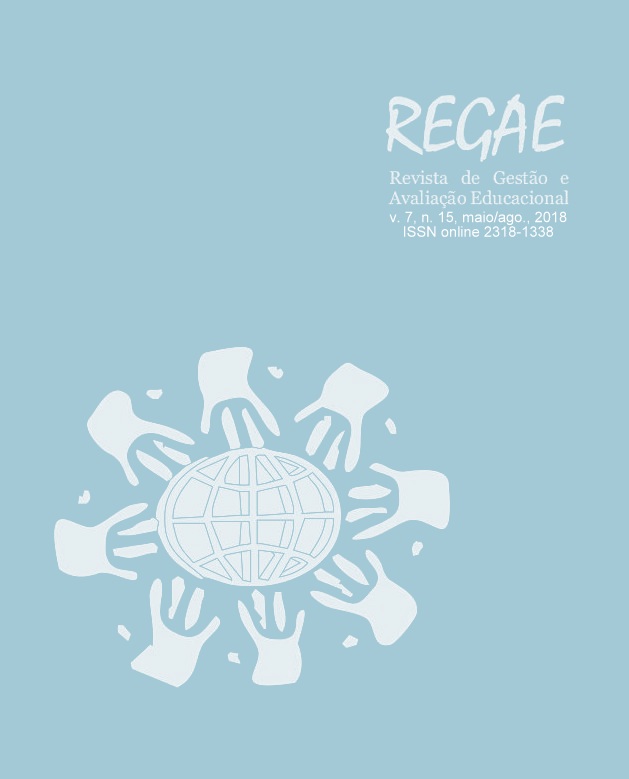School council and practices in the democratic management of the public school
DOI:
https://doi.org/10.5902/2318133831679Abstract
The article is the result of a research developed with managers, collegiate members and teachers of a school of the state school network of the Municipality of Capitão de Campos-PI. The research comprises a case study with a qualitative approach, with themes related to the School Council and for participation as a guiding principle of Democratic Management. Its development was based on the ideas and conceptions of Paro (2016), Lück (2009), Libâneo (2001) and Marques (1990). The general objective of the research is to understand the role of the school council in the practices of democratic management, with the specific objective of reflecting on concepts attributed to democratic management; analyze in the interviewees' speeches characteristic aspects of democratic management and identify principles and dimensions of this management model. Regarding the problem, it seeks to respond, as the participation in the development of activities, contributes to effective democratic management in school? The technical procedures for data collection were bibliographic research and interview, regarding the analysis, was performed through categorization. As a result of the research, it was found that the active participation of professionals and the school community in the development of activities contributes significantly to the democratic management model being effective, either by influence in decision making, or by the direct action of the school council It was also concluded that the effectiveness of this management model is a mechanism that allows developing activities aimed at the full development of the student, professionals and society in general.
Key-words: democratic management; school board; participation.
Downloads
References
ARAÚJO, Adilson César de. Gestão democrática da educação: a posição dos docentes. Brasília: UNB, 200. 220f. Dissertação (mestrado em Educação). Universidade de Brasília.
BRASIL, Lei de Diretrizes e Bases. Lei n. 9.394/96, de 20 de dezembro de 1996.
BRASIL. Plano Nacional de Educação 2014-2024 [recurso eletrônico]: Lei nº 13.005, de 25 de junho de 2014, que aprova o Plano Nacional de Educação (PNE) e dá outras providências. - 2. ed. - Brasília : Câmara dos Deputados, Edições Câmara, 2015. - (Série legislação; n. 193)
BRASIL. Conselhos escolares: democratização da escola e construção da cidadania. Brasília: MEC, 2004.
BRASIL. Constituição da República Federativa do Brasil. Brasília: Senado Federal: Centro Gráfico, 1988.
FERREIRA, Aurélio Buarque de Holanda, 1910-1989. Novo Aurélio século XXI: o dicionário da língua portuguesa. Rio de Janeiro: Nova Fronteira, 1999.
LIBÂNEO, José. Carlos. Organização e gestão da escola: teoria e prática. Goiânia. Alternativa, 2003.
OLIVEIRA, Dalila. Andrea de (org.). Gestão democrática da educação: desafios contemporâneos. Petrópolis: Vozes, 1997.
LIBÂNEO, José Carlos. O sistema de organização e gestão da escola. In: LIBÂNEO, José Carlos. Organização e gestão da escola: teoria e prática. Goiânia: Alternativa, 2001, p. 25-45.
LIBÂNEO, José. Carlos. Organização e gestão da escola: teoria e prática. Goiânia: Alternativa, 2004.
LÜCK, Heloísa. Gestão educacional: uma questão paradigmática. Petrópolis: Vozes, 2006.
LÜCK, Heloísa. Dimensões de gestão escolar e suas competências. Curitiba: Positivo, 2009.
MARCONI, Marina de Andrade; LAKATOS, Eva Maria. Técnicas de pesquisa. São Paulo: Atlas, 1999.
MARQUES, Mário Osório. Projeto pedagógico: a marca da escola. Revista Educação e Contexto. n. 18, 1990, p. 13-30;.
PARO Victor Henrique. Gestão democrática da educação pública. São Paulo: Cortez, 2016.
PRODANOV, Cleber Cristiano, FREITAS, Ernani César. Metodologia do trabalho científico: métodos e técnicas da pesquisa e do trabalho acadêmico. Novo Hamburgo: Feevale, 2013.
YIN, Robert K. Estudo de caso: planejamento e métodos. Porto Alegre: Bookman, 2001.
Downloads
Published
How to Cite
Issue
Section
License
Authors keep copyright and concede to the magazine the right of first publication, with the work simultaneously licensed under the Creative Commons Attribution 4.0 International, non-commercial license with no derivative work, which allows to share the work with no author recognition and initial publication in this magazine.
Authors has authorization to overtake additional contracts separately, to distribute a non-exclusive version of the work published in this magazine: For example: to publish in an institutional repository or as a chapter of a book, with authorial recognition and initial publication in this magazine.
Authors are allowed and are encouraged to publish and distribute their work online. For example: in institutional repositories or in their own personal page – at any point before or during the editorial process, because this can result in productive changes, as well as increase the impact and the mention to the published work.






